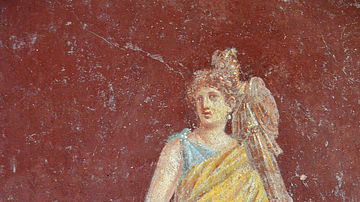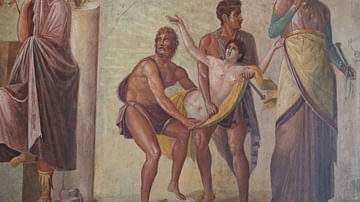Search
Search Results

Definition
Iphigenia in Aulis
Iphigenia in Aulis (or at Aulis) was written by Euripides, the youngest and most popular of the trilogy of great Greek tragedians. The play was based on the well-known myth surrounding the sacrifice of Agamemnon and Clytemnestra's daughter...

Image
Iphigenia with the Palladium
Fresco depicting Iphigenia, daughter of King Agamemnon, with the Palladium (cult image of Pallas Athena). Mid-1st century CE. From Room 30 of the Villa San Marco in Stabiae, Italy.

Image
Myth of Iphigenia Mosaic, Empuries
A Roman floor mosaic emblemata depicting the myth of Iphigenia and her (almost) sacrifice by Agamemnon, her father, prior to the Trojan War. From a Roman villa, Empuries, 1st century BCE. (Archaeological Museum, Empuries, Spain)

Image
The Sacrifice of Iphigenia
Fourth Style fresco depicting the Sacrifice of Iphigenia, from the House of the Tragic Poet in Pompeii. 1st century CE. (Naples National Archaeological Museum) Iphigenia is dragged to the altar as a sacrificial offering to Artemis. On either...

Image
Mosaic with Orestes & Iphigenia
A Roman mosaic depicting Orestes and Iphigenia. The mosaic was the emblemata (centrepiece) of a larger floor mosaic. From the Horti Maccenatiani, 2-3rd century CE. (Capitoline Museums, Rome)

Definition
Euripides
Euripides (c. 484-407 BCE) was one of the greatest authors of Greek tragedy. In 5th century BCE Athens his classic works such as Medeia cemented his reputation for clever dialogues, fine choral lyrics and a gritty realism in both his text...

Definition
Agamemnon (Play)
The play Agamemnon was written by one of the greatest Greek tragedians Aeschylus (c. 525 – 455 BCE), “Father of Greek Tragedy.” Older than both Sophocles and Euripides, he was the most popular and influential of all tragedians of his era...

Article
The Ancient Concept of a Noble Death
The act of voluntary death was never condemned in antiquity. In fact, The English word "suicide" comes from the Latin for "self-slaying." The reason for a voluntary death had to be one that was honorable and necessary to remove any element...

Article
Love, Sex, & Marriage in Ancient Greece
Love, sex, and marriage in ancient Greece are portrayed in Greek literature as distinct, yet closely intertwined, elements of life. For many upper-class men, marriages did not take place for love, and other relationships, be it with men or...

Definition
Artemis
Artemis was the Greek goddess of hunting, wild nature, and chastity. Daughter of Zeus and sister of Apollo, Artemis was a patron of girls and young women, and a protectress during childbirth. Artemis was widely worshipped but her most famous...